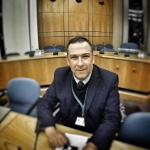I am a proud Jew and grew up in a large Jewish community in Manchester. There were many Holocaust survivors in our community. A very famous survivor, Mayer Hersh lived next door to my uncle.
My twin brother and I would ask him endless questions whenever we bumped into him about what it was like living in a concentration camp. He was always very gracious with his time and would always answer our questions. Mayer Hersh dedicated a large part of his life touring schools all over telling his story of survival and was awarded an MBE for his work in Holocaust education. He lived and breathed the mantra 'We must never forget'.
It is only when I look back to my childhood with free access to Mayer and other Holocaust survivors that something quite extraordinary occurs to me. Whenever the survivors told their stories, they never showed any anger. Even if they did hold hatred towards Nazis, they never expressed it. I think that is because it was hatred that led to the industrial mass extermination of Jews and other ethnic and minority groups during the holocaust and they know better than anyone what hate leads too.
As a birthday gift to myself, I decided to visit one of the places on my bucket list. Somewhere I have always wanted to visit is Auschwitz-Birkenau.
When I told my brother that I would be making the trip, he decided to join me, along with my nephew. My nephew is married to a Pole who's grandfather rescued and hid Jews at his farm in Pyskowice at enormous risk to himself and his family. The Nazi's publicly shot or hung people who were Jew sympathisers.
I was very apprehensive about visiting Auschwitz-Birkenau. Of course, I had grown up and heard first-hand accounts from many survivors, visited the Holocaust museum in Jerusalem and was well educated about this dark chapter in human history.
As you go through the now infamous gates, it does send a chill up your spine. I won't go into much detail about Auschwitz except to say the "Material Proofs of Crime" exhibition helps put adequate perspective on the industrial scale of crimes committed. They show all the children's shoes that they collected after being made to strip naked on the pretence they were to take a shower. We now know they were led into a gas chamber to have their lives snuffed out almost before they had begun. The exhibition had thousands of pairs of tiny shoes, stacked up so high as you walk through them in one huge room that they tower above you. It is unbelievably chilling.
Most of my immediate family which consists of Russians, Germans and Poles, realised what was going on and managed to escape the pogroms of Europe long before the war. I guess I would not be living in Surrey had they not got out and made a new life for themselves in England. My great, great grandfather who arrived in Manchester changed our surname from Dietz to Deach as people had trouble pronouncing the name. My brother and I searched a database, made available at one of the exhibitions of Jews who died at Auschwitz. Perhaps one of them was a distant relative. We only found two names but have no idea if they were related.
I should also mention the gas chamber and crematoria as we left the camp. I felt sick as I walked through silently. My brother nudged me and motioned to look up. That was the hole were an SS soldier would drop pellets of Zyclon B into the chamber crammed packed with hundreds of Jews and other prisoners. Out on the other side, there were crematoria were the bodies were turned to ash.
Appropriately the longest-serving commandant of Auschwitz, Rudolf Höss, was hanged outside that very gas chamber after being found guilty of Nazi Crimes against the Polish nation. His gallows are still there.
The Birkenau part of the camp is about 1 and a half kilometres away from Auschwitz. As we arrived and walked through the entrance, I tried to imagine thousands of Jews coming off the cattle trucks after being crammed in with just one bucket meant for sanitation. The journey for some took days, so the conditions in those cattle vehicles are unimaginable. Many died from the journey before even reaching Auschwitz-Birkenau.
The moment they got of the cattle truck, anyone considered not fit to work was separated from the rest of their family. Most of the survivors later testified that was the last time they saw brothers, sisters, mothers, fathers, aunts, uncles and grandparents. They were immediately marched to the gas chambers and their lives snuffed out. The noise of people crying, the fear they must have all felt, their overwhelming sense of misery and helplessness is impossible to comprehend.
My immediate thought when I arrived and went through the main entrance archway was just how huge Birkenau is. It is gigantic. I think if you were to walk around the whole camp (which we did not), I think it would take an entire day. We looked into some of the living quarters for the prisoners. They were horrific. There were four hundred people to every shed. In the winter, they were freezing. It is not unusual for temperatures to drop below -20c in that region. Prisoners were given no warm clothing, so many of them did freeze to death. They were all purposefully starved with very little to eat every day. We have all seen the shocking images of malnourished survivors as the Russian soldiers liberated the camp at the end of the war.
We found our way to the gas chambers at the far side of the camp. As the Russian Army advanced, towards the very end of the war, the Nazis tried to cover up their crimes as they were running away by blowing up the gas chambers, but they did not do a very good job. The destroyed gas chambers and crematoria stand there today exactly as they left them.
My nephew told me that the ash from the death camps would fall on villages, towns and cities miles and miles away and the wind would carry the smell of burning bodies to his in-law's community in Pyskowice which is over an hour away.
Visiting Auschwitz-Birkenau had a profound effect on me. It puts a lot of things into perspective, and I will never forget my visit there.
We must always remember what happened at Auschwitz-Birkenau and other mass extermination camps during the Holocaust.
- Cllr Paul Deach, Surrey County Councillor for Mytchett, Frimley Green & Deepcut


